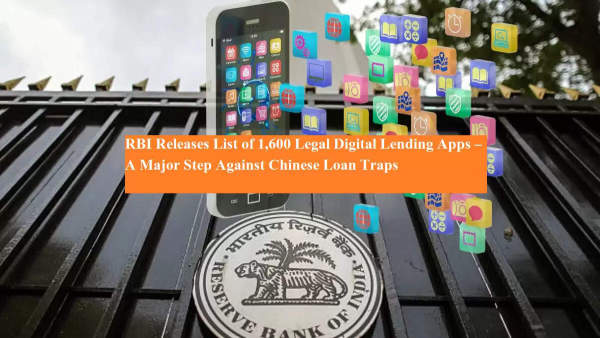
To protect Indian consumers from financial fraud and digital loan traps, the Reserve Bank of India (RBI) has taken a strong step by releasing an official list of over 1,600 legal digital lending apps. Here’s everything you need to know about this crucial move and how it safeguards borrowers.
The Reserve Bank of India (RBI) has released a verified list of 1,600 digital lending apps (DLAs) that are officially approved to operate in the country. This proactive measure aims to help users distinguish between genuine and fraudulent loan platforms.
In recent years, the rise of unauthorized Chinese loan apps has created a serious risk for consumers. These apps often lure users with instant loans, only to later charge exorbitant interest rates and misuse personal data to blackmail borrowers. The RBI's list is a long-overdue step toward curbing these predatory practices.
Some of the most well-known and trusted digital lending platforms have been included in the list. These include:
Google Pay
Paytm
PhonePe
BharatPe
LendingKart
Navi
Axio
All of these apps are available on Google Play Store and Apple App Store, and users are encouraged to verify an app’s status before borrowing.
👉 To check the complete list, visit the RBI's official website or portals where the list has been published under “Verified Digital Lending Apps”.
India has witnessed a surge in predatory Chinese loan apps that exploit digital platforms to trap users in high-interest loans. These apps:
Demand access to personal phone data during loan applications
Use morphed photos and videos to blackmail borrowers who miss payments
Charge sky-high interest rates and hidden fees
Engage in data theft and illegal transfers to foreign servers
In several cases, borrowers were harassed to the extent of mental distress and public humiliation. With national security and data privacy at stake — especially amidst ongoing tensions with China — this step by RBI holds deep significance.
This isn’t the first time Indian authorities have cracked down on digital lending fraud:
In September 2022, the Enforcement Directorate (ED) raided offices of payment gateways such as Paytm, Razorpay, PayU, and Cashfree for facilitating transactions of shady loan apps.
Later, the IT Ministry blocked 94 Chinese-origin apps, citing links to money laundering, illegal data storage, and data transfers to China.
These apps were reportedly controlled by Chinese nationals and posed significant threats to both users' financial well-being and India’s data sovereignty.
The list brings transparency to the digital lending ecosystem, helping users identify legitimate lenders easily.
By restricting access to illegal apps, RBI is reducing the risk of users being subjected to blackmail, privacy invasion, and mental harassment.
Many unverified apps had been allegedly transferring Indian users’ data to foreign servers, especially in China. The crackdown ensures data stays within secure jurisdiction.
With the digital finance industry growing rapidly, the RBI’s move boosts consumer confidence in using fintech services.
Always check if the app is listed by RBI before borrowing any money.
Do not grant unnecessary permissions like access to contacts, gallery, or messages.
Never share sensitive information (like OTPs, Aadhaar, PAN, or bank details) through suspicious platforms.
Report any fraud or suspicious activity to the cybercrime helpline (1930) or visit cybercrime.gov.in.
The RBI’s initiative to release a verified list of digital lending apps is a critical move to protect Indian borrowers from predatory digital lenders. It not only empowers consumers to make safer financial choices but also plays a vital role in safeguarding national data and promoting ethical digital finance practices.
So, before downloading any loan app — verify, stay informed, and protect your data.